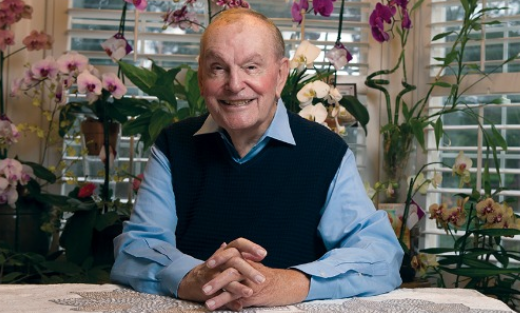Articles
'Tis the Job Hunt That's Ruining America
Author: Dick Bolles
Needless to say, I am not a politician. I'm only an expert about "the job hunt." But this does cause me to stay riveted on all that goes on in our nation's capital, because I've never seen a place more screwed up by The Job Hunt, in my whole life. In the legislative and executive branches of our government, the job hunt is their obsession. They try to conceal that simple fact by giving it a more high-falutin' name. They call it "re-election." But beneath the facade of that language, it's still their job hunt.
It's breathtaking to watch how, in the interests of their next job hunt, they will do, say, or promise, almost anything.
They all have what we in our industry call "contract jobs" -- jobs that they have only for a set amount of time, and then they have to get rehired. This keeps their eyes riveted on the people who have the power to hire them again, and if they think it will improve their chances of getting rehired, they will say one thing when they're trying to get the job, say the opposite thing once they have it. Once rehired, they will completely reverse their decisions on the job, from week to week: they will sponsor a bill one week, vote against that very same bill the next week. They will even say No to everything, if they think it will help them with their next job hunt.
Why do they like this job so much, why do they want this job so badly? Well, for one thing it has a great health plan. For another, they get some mouthwatering special benefits and favors. And, probably most importantly, the job gives them a lot of power, for as long as it lasts. In an organization with 100 employees, (the Senate) one man or woman can thwart the will of the other ninety nine.
They don't need to take a Dale Carnegie course; this job, from beginning to end, depends on their being able "to win friends and influence people." That's the skill that most determines whether or not they are successful in their next job hunt. It is the sine qua non of the job.
So, what does all this add up to? Simply this: their obsession with their own job hunt is ruining America. It's causing things not to get done that should be done. It's causing things that should not get done, to be done. It's corrupting the fight to make this a better and more compassionate country, toward its own citizens.
I know what you're thinking, of course. You think I'm talking about one particular political party. Nope. Wrong. I'm talking about how, decade after decade, the whole Congress and the Executive Branch, decide altogether too many of their policies, decisions and votes by one criterion above all others: "will it help my next job hunt?" "Will it help me get re-elected?" Until, of course, they're ready to retire.
So, I have this comforting thought for you: if you are unemployed, and worrying about how to find your next job, don't worry. You have friends in Washington,who know exactly how you feel, because they are in the same boat as you are. They may be employed temporarily for the moment. But they're just as worried about their jobs as you are.
Friends? Well they would be, if they ever saw any connection between their situation and yours. But I wouldn't hold out much hope. They are so obsessed with their own situation that they never stop to consider how similar it is to yours. "You're looking for work? Sorry, I don't have any time to help you. I'm up for re-election."
Why Pursuing Your Dream Is Still Important
Author: Dick Bolles

In deciding what you want to do with your life, or what you want to do next with your life, there are only three questions to ask yourself: WHAT, WHERE, and HOW.
1. WHAT do you most love to do?
2. WHERE would you most love to do it? and
3. HOW do you name such jobs, and how do you find such jobs?
That word Love is important. You want to look for your passions (what you'd most love to do), rather than just your competencies (what you can do). In my 44 years of experience in this field, I have found this is terribly important. Oh, some "experts" will claim that it's hard enough to find any work during this long slow U.S. recovery from the 2008 Recession, so this is no time to be picky. Don't believe them. It's always time to be picky. Here are five reasons why:
1. In this imperfect world, odds are you'll only find part—not all—of what you're looking for, at least in the beginning. So if you aim for all of your dream, and at first find only half of your target, good news: you've found 50% of your dream job, right off. On the other hand if, out of fear, or the desire "to be realistic", from the beginning you aim for only half of your dream, and end up with half of that, you've found only 25% of your dream.
2. If your job-hunt drags on, as is the case more often since the 2008 Recession, you need something that will keep you at it! Pursuing what you'd most love to do will give you the determination to keep on going with your job-hunt or career-change, even during rough patches. "If I get this, or even something close to this, it will all be worth it."
3. If your job-hunt drags on, you need to replenish your energy along the way. Pursuing what you'd most love to do will give you the energy to keep on going, even during rough patches. (Notice, in other situations, when you're talking to a loved one, and you get on some topic you're enthusiastic about, how your energy level rises. You feel renewed. So, here.)
4. You need another way to find organizations than just waiting for them to announce a vacancy. If you first identify what you'd love most to do, it's relatively easy then to identify and research places that might have such jobs. And you can then approach them through your contacts, before they ever announce their next vacancy.
5. Once you get a job interview at places of your choice, you need to stand out from the other (say) nineteen people they're interviewing there. It is the enthusiastic job-seekee rather than the one who can just do the job, that stands out in any interviewing process. If it's your whole dream you're after, you will be enthusiastic, without even trying, because you're about to get closer to your dream. Not so enthusiastic, if it's only one quarter of your dream.
For People of Faith, A Word or Two
Author: Dick Bolles
I grew up in the Christian church. That is to say, I grew up in the Land of Faith, and I have always found it to be a lovely land. It is full of beauty, color, light, sound, mercy, love, forgiveness and compassion. It is a land of joy, strength, and laughter. Because I live in the Land of Faith, now at age 88 I have a city inside my head: memorized music from the great composers, poetry, texts, hymns, images—they’re all playing in there; and I have fellowship and a bond with others who also hunger that there be a God, and love the idea that we have a Creator.
I have friends, of course, who know no such hunger. They not only do not believe we have a creator, they feel no need that there be one. Some of them, indeed, are glad there is no one to whom they will be ultimately accountable, or to whom they owe Gratitude.
Talk between those who feel a hunger that there be a God and those who do not, is usually not very fruitful. The conversation usually degenerates into each side trying to convince the other that they are wrong. For example, Richard Dawkins, in his book The God Delusion states “If this book works as I intend, religious readers who open it will be atheists when they put it down.“ There are also the famous atheist billboards in New York’s Times Squareand elsewhere. On the other side, there are fundamentalist and evangelical Christians who feel a deep need to convince those who have no hunger for God, of the error of their ways—and they have Biblical texts to justify their doing this.
I myself have never been a fundamentalist, and never could be one. I have never felt any need to convert those who feel no hunger for God. My thoughts run in another direction, entirely: Let it be, let it be, let it be. We who have a hunger for God should just place those who do not, into the hands of the God they do not believe in. And let it be. Speaking words of wisdom, let it be.
But among ourselves, I think we should talk. Talk and share. By the age of 88, you have had a lot of experiences. A lot. And you have learned a lot. So, I thought today I would share my experiences with prayer. Particularly with prayer for healing. When I have seen prayers for the healing of someone, and small miracles then occur, I have noticed certain things that hinder such prayers, and certain things that seem to help. So, here are my learnings, for what they're worth:
1. They begin by focussing on God, and thanking Him (Her) for all past blessings in their life. If we are not grateful for what we have already received, why should we think that we will receive any more?
2. They then tell Our Creator, that they trust in His power to intervene in our lives, but only when invited in.
3. They picture to themselves a door, and beyond that door lies a beautiful countryside with a radiant, healed person, for whom they are praying
New Video Course Launched June 29
Author: eParachute
Breaking News from eParachute
Good News. Dick (Bolles) has just completed his first online video course in 45 years. It has hours of video plus handouts to print, exercises to do, insights to gain. It's called The eParachute Introduction to Your Career and Job Search. We are delighted to announce it launched Monday, June 29th.
The course will sell for $129. There is however a 69% discount for those who sign up now. That price price is only $39. And then you own it for life.
We've been trying for ages to find some way to make Dick's famous workshop available to job counselors, job hunters, and people searching for their dream. We've finally done it. Hours of videos (all with Dick Bolles), oodles of handouts and exercises, loads of fresh insights. The course is available for either individuals or groups to do in their own time, at their own pace -- wherever they are in the world.
If you are interested, go now to the signup page at www.eParachute.com/course The discount coupon will then be mailed to you..
Workforce Magazine Article 1/28/2015
What Color Is Dick Bolles' Parachute? Golden.

"Despite emerging in the post-Watergate twilight of the anti-Vietnam War era, career experts say “Parachute” remains as relevant as when it first appeared. “Maybe even more so, considering the structural changes in how work is organized today and the fact many people have a portfolio of multiple careers,” said Rich Feller, a professor of counseling and career development to master’s and Ph.D. graduate students at Colorado State University. Feller, a past president of the National Career Development Association, added the book has “nudged the field to stay current every year, not only on how to do a job search but also the notion that career development is a lifelong experience. Dick has provided the framework for us to help people transfer their skills to new possibilities.”
“Parachute” has won accolades for its impact on the world of work. The Library of Congress’s Center for the Book names it one of 25 books that have shaped readers’ lives, a list that includes such literary classics as Mark Twain’s “The Adventures of Huckleberry Finn,” Harper Lee’s “To Kill a Mockingbird,” Leo Tolstoy’s “War and Peace” and “The Diary of Anne Frank.” The U.S. Labor Department includes “Parachute” among books that shaped work in America since 1758, a collection that includes Benjamin Franklin’s “Poor Richard’s Almanack,” Adam Smith’s “Wealth of Nations” and John Steinbeck’s “Of Mice and Men.” Time magazine ranks “Parachute” 22nd on its list of the top 100 most influential nonfiction books.
